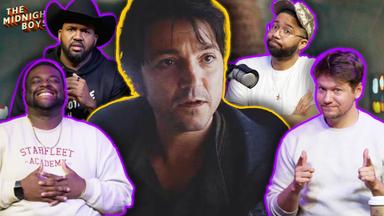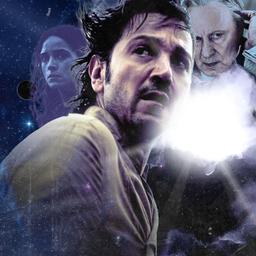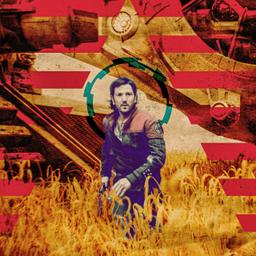
“Here we are.”
Three simple words, uttered three times: once by Luthen Rael to Cassian Andor, once by Luthen to Mon Mothma, and once by Mon to Bail Organa. All in the span of a single episode: “Welcome to the Rebellion,” the finale of Andor Season 2’s latest three-part arc.
These three pronouncements, delivered on Disney+ on Tuesday, signal the significance of each decision as Andor’s end draws near. After all the spying, plotting, and surgical strikes, the nascent rebellion is about to go loud and announce its presence with authority. But “here we are” also signals the centrality of these characters to our experience of the series’ events. The likes of Luthen, Cassian, and Mon are the lenses through which we follow, and feel, this sweeping story. The genius of Andor is that while its galaxy-altering events are transpiring—while Ghormans are dying en masse so that their planet can be razed to supply the raw materials for a superweapon; while countless beings are listening to a sitting senator accuse the Emperor of genocide; while the Rebel Alliance is officially being born—each devastating development is refracted through the perspective of someone we know. Even in its penultimate mini-trilogy, Andor has made a full-scale civil war personal.
For all its virtues, the original Star Wars trilogy—especially the first film, which started it all—didn’t, and couldn’t, convey what it took for the good guys to get to the big battles. Of the core cast, Leia was the only one who had skin in the game in the Rebellion before the Millennium Falcon took off from Tatooine, and she was a teenager whose history was hardly explored. Everyone else had been sitting on the sidelines, by choice or necessity, throughout the long lead-up to open, triumphant revolt.
Arriving long after the battle lines had been drawn, just in time to finish the fight, made Luke Skywalker and Co. perfect proxies for viewers. But while it was thrilling that Luke Skywalker fired those fateful proton torpedoes into the Death Star’s exhaust port after he served less than a week in the rebel ranks, I now imagine longtime freedom fighters like General Davits Draven (played by Alistair Petrie in Rogue One and Andor) looking at Luke and Han at the medal ceremony and thinking, Them? When did those guys get here?
Cassian Andor might have thought that, too, had he survived to see his heist on Scarif come to fruition in the form of an expanding, Death Star–sized explosion over Yavin 4. Then again, he would have been happy for Han and Luke to get the glory; he wouldn’t have wanted a medal. If he’d lived to see the conclusion of the Battle of Yavin, he probably would’ve declared “I’m done” for the umpteenth time, set off to bring Bix back to their beautiful, rebel-base-adjacent bungalow, wound up freezing his ass off on Hoth anyway, and then risked everything to spirit away crucial intel on the second Death Star—only for the Bothans to take credit. That was his lot in life, and in death. The visceral way in which we understand that life and the heft that our new knowledge imparts to the original trilogy’s traditional hero’s journey have made a 24-episode prequel to a prequel more than worthwhile.
Luthen saying “here we are” to Cassian is particularly rich given that the two of them weren’t very involved in Episode 9’s heroics, as far as the official records are concerned—both the in-universe version of events and our universe’s pre-Andor Star Wars canon. History may be written by the victors, but not necessarily the whole history. As Mon says in her final Senate speech, “The death of truth is the ultimate victory of evil”—unless truth has to die to defeat evil. Mon wouldn’t have completed her dramatic flight from Coruscant without Luthen and Cassian’s help, but it’s deemed to be better for morale for Mon’s escort to be part of the rebel establishment. Consequently, not only will Luthen never see the sunrise, but no one will know he helped make it. As he said last season, “The ego that started this fight will never have a mirror or an audience or the light of gratitude.”
Andor’s audience has plenty to feel grateful for this week. “Messenger,” “Who Are You?,” and “Welcome to the Rebellion,” directed by Janus Metz and written by Dan Gilroy, are peak Andor and thus, by extension, peak Star Wars—the best the series has been since the Narkina 5 and Ferrix arcs in Season 1. Once again, Andor took its time to pick up steam. Once again, it’s operating on an unparalleled level now that the story machinery is warmed up. And once again, a local peak is accompanied by a memorable monologue by a character who’s staging a prison break. Last season, Kino cooked on mic. Now it’s Mon’s turn as she escapes her gilded cage.
Mon’s prison doesn’t have electrified floors, but it might as well, considering how gingerly she has to step. On Narkina, nobody’s listening, but on Coruscant, everybody is. Not just Kloris, her ISB plant of a driver, or the ISB eavesdroppers who monitor the bug in her office, but even her close confidant Erskin Semaj—a secret agent of Luthen’s who’s been embedded at Mon’s side for years, since the Chandrilan wedding we saw in this season’s first batch of episodes. It’s another example that bears out Luthen’s statement last season: “I'm condemned to use the tools of my enemy to defeat them.” Mon feels deeply violated now that one of those tools has been turned on her. “Right now, I’m more afraid of you than anything,” she tells Luthen.
On Andor, though, interpreting who has the high ground, morally speaking, is rarely a clear-cut exercise. “We’ve all been bent by secrecy, haven’t we?” Luthen allows, but he doesn’t regret protecting Mon, through Erskin, in “ways [she’ll] never know.” She does know about one way: Luthen ordered a hit on her friend (and, in Luthen’s words, “false savior”) Tay Kolma, who may or may not have become the major security risk Luthen foresaw. Better safe than sorry—or, in this case, safe and sorry.
“I’ve tried to protect you,” Luthen insists, to which Mon responds, “And you’ve failed.” He’s failed to protect her feelings, but Mon isn’t sorry to have help from Luthen’s men when a member of the extraction team hired by Bail Organa turns out to be an ISB double agent, leaving Erskin and Cassian as her only hopes to escape the Senate. She recognizes Cassian when he repeats the phrase Luthen had barked at her: “I have friends everywhere.” Operatives, yes. Contacts, of course. But friends? Not the man who said he’s sacrificed kindness, kinship, and love for the cause.
If Mon gets arrested, Kleya warns, “It all comes down”—“it” being Luthen’s network and perhaps the whole fledgling rebellion. But if she escapes, the “it” could be the Empire. Naturally, Mon’s last words to the Senate, enabled by Bail and Star Wars Nancy Pelosi, are powerful ones that feel crafted for our galaxy and time: “The distance between what is said and what is known to be true has become an abyss. … Of all the things at risk, the loss of an objective reality is perhaps the most dangerous. The death of truth is the ultimate victory of evil. When truth leaves us, when we let it slip away, when it is ripped from our hands, we become vulnerable to the appetite of whatever monster screams the loudest.”
Luthen won’t leave with Mon: “No Yavin for me,” he says, prompting Cassian to snap, “There’s still some bridges you haven’t burned.” By his own admission, Luthen has burned his decency and his life, so that’s not a bad supposition. Really, though, there’s no place for Luthen in the Alliance’s command structure. The rebels are still desperate but no longer in disarray: As Bix says to Wilmon, “Things are getting really organized around here.” It’s hard to imagine Luthen or Saw Gerrera checking in with their duty officers upon reporting to base. So the rebellion Luthen helped build appears to have passed him by as it’s transformed into a “real army” with “new rules” and, Vel says, “a little discipline.”
Mon’s speech and escape come about because of a second Ghorman massacre, perpetrated by the Empire in the same Palmo Plaza as the first. “It’s a trap,” Ghorman Front leader Rylanz, who’s been sidelined like Luthen, says in Episode 8, beating Admiral Ackbar to his catchphrase as the Empire lures demonstrators to the plaza turned slaughterhouse. The unheeded advocate of peaceful resistance adds, “We’ll be silent when we’re dead.”
That’s the Empire’s plan. The understated, euphemistic way in which Major Partagaz relates the fate of the world Dedra has helped doom—“It’s bad luck Ghorman”—makes the extermination more chilling. (Andor always emphasizes the banality of evil.)
One of the long-running questions about Andor has been whether Syril, broken by his past, could be turned. “Who Are You?” gives us our answer. As mining ships land across Ghorman, Syril realizes that he’s been the Empire’s patsy—and Dedra’s. For all his shortcomings, Syril has never been bad at the detective-work portion of his job (the inspiring-speeches part is another matter). In this case, he just didn’t know what his real job was, and unlike the Empire, he had ample incentive not to dig.
When, belatedly, the crisis on Ghorman makes Syril remove his blinkers, he barges into Imperial HQ and starts peppering Dedra with questions: “What have you done? What are we doing here?” And, most insistently, “What kind of being are you?” Syril chokes the info out of her and storms out, not wanting to be part of the atrocities on tap but aware that the damage is done. He traded a domineering, manipulative mother for a domineering, manipulative girlfriend (who slaps him in Episode 8, just as Eedy did last season), and although he finally revolts, the time for him to “start making [his] own decisions,” as Cassian puts it, has passed.
What wakes him up? Maybe it’s the realization that he’s been used and duped by the Empire—and the woman—whose respect he’d sought from the start. (He craved validation and, as Dedra says, didn’t mind the promotions, which for one thing helped get Eedy off his case.) Maybe it’s a sincere sadness for Ghorman, whose people and culture he seems, on some level, to appreciate. Maybe it’s an epiphany that he’s inadvertently violated the only principle he had. As he asks Dedra in Season 1, “Can one ever be too aggressive in preserving order?”
One can, of course, so Syril’s hands were dirty, if not bloody, before he ever got to Ghorman. But it’s dawned on him too late that by backing the baddies, thereby becoming one, he’s brought about deadly disorder. Syril couldn’t stomach his old boss’s orders to cover up a crime, which spurred him to bring Andor to justice. And now he’s deeply implicated in covering up the Empire’s much more heinous acts. “They don’t even bother to lie badly anymore,” Ghorman senator Oran says. “I suppose that’s the final humiliation.”
When Syril spots and tackles Cassian, his rage also seems partially self-directed. He’s pummeling and choking Cassian not just because of his old grudge against him but also because Cassian unwittingly started Syril down a dark path that led to genocide. And then, just when Syril has the upper hand against the adversary he’s dreamed about finding and besting for years, Cassian hits him with the most devastating put-down heard on TV since Don Draper told Michael Ginsberg that he didn’t think of him at all: “Who are you?”
Cassian’s question, which gives Episode 8 its name, rocks Syril harder than a haymaker and causes him to lower his weapon. It’s more devastating than that Mad Men line, actually, because Don did think about Ginsberg: In fact, he felt threatened by him, which was why he affected such studied unconcern. Cassian truly never spared a thought for Syril—never even knew who he was. Syril, in the last instant before Rylanz’s blaster bolt burns through his brain and turns out the lights for good, is forced to confront two painful facts: His whole crusade was neither romantic nor righteous, and he’s anonymous to his nemesis. Syril has led a meaningless life, or worse, and the Syril redemption arc, such as it is, ends here. Uncle Harlo would not be pleased.
Dedra isn’t pleased by the proceedings, either. She’s even more of a monster than Syril—see her delight in Dr. Gorst’s torture techniques, which were drawn from an earlier Imperial genocide—but she’s become increasingly agitated as Ghorman circles the drain. She didn’t seek this assignment, but she’s played her part for promotions, too. As Dedra stands on the balcony above the chanting, singing protesters in Ghorman, she grimaces like the Grinch as he listens to the Whos in Whoville. Dedra’s heart is still sizes too small, but she has one.
Faster than you can say “deep substrate foliated kalkite,” the demonstration devolves into violence, just as the Empire had anticipated (and orchestrated). And after the deeds are done, Dedra claws at her high, stiff collar. Syril no longer has his hands around her throat, but that age-old excuse about “following orders” isn’t assuaging her suffocating guilt—not to mention her sense, first expressed in Season 1, Episode 7, that just as the Ghorman Front played into the Empire’s hands, the Empire has played into the rebels’. (Or, at least, Luthen’s.) Episode 8 ends with Ghorman burning very brightly indeed. Both Cassian and Eedy Karn cry, shedding tears for different victims and blaming different perpetrators.
The events of Rogue One, which Andor directly leads into, are coming closer. Therefore, the movie’s cast is coming together, and the foreshadowing is strong. Mon meets Cassian. Melshi shows up on Yavin, signature blaster in tow. K-2SO is captured and reprogrammed. The hotel attendant on Ghorman gives Cassian a line he’ll later use: “Rebellions are built on hope.” When Draven tells Cassian not to leave Yavin on a mission for Luthen, Cassian says, “The day I need permission to come and go, I’m gone,” a call forward to the film’s unsanctioned, titular raid on Scarif.
And although the show stops short of invoking the Jedi, it does engage in Force mysticism this week, as Rogue One did via Chirrut Îmwe and Jyn Erso’s kyber pendant. The Force healer on Yavin, “a cook in the mess hall,” may not be able to channel its power regularly, but she certainly seems to in helping Cassian with a wound that wouldn’t heal. “Most beings carry the things that shaped them,” the healer tells Bix. “They carry the past. But some, very few, your pilot … they’re gathering as they go. There’s a purpose to it. He’s a messenger. There’s some place he needs to be.”
Did the healer foresee his death? Did Cassian? “I know you felt something,” Bix says. “That’s why you’re so upset.” Bix herself has had previous premonitions: In Season 1, she tells Cassian that she’d dreamed about him climbing over a wall to return to her, and earlier this season, she said, “I had a feeling you were coming back.” Now, Cassian seems to have an Agony in the Garden moment in which he searches for a way out of the fate that Luthen forecast last season. Luthen’s getting in on the woo-woo, too: “You appeared when I needed you,” he tells Cassian. “Aldhani. Narkina. Ferrix. Sienar. Mina-Rau. Ghorman. And here we are.”
Could Cassian be fighting for agency because he feels that the Force—or the writers of Rogue One and Andor—have guided his hand, forcing him (so to speak) back into the fray when he just wants to wait out the war on Niamos? The tenuous conception of the Force in Rogue One and Andor mirrors real-life religion more than it does the Jedi depiction. After all, if you can call on the power you worship at will, then you hardly have to have faith. That’s one reason why Andor, a story based not on battles between superheroes and supervillains but on regular people who rise or sink in the face of a terrible occasion, surpasses the Skywalker saga in some respects.
Cassian tries to talk Bix into running away with him, as he once did in vain with Maarva. Instead, Bix runs away without him, so as not to tempt him off his possibly preordained path. Cassian has, at last, sacrificed everything—his home, his happiness, his love—for the cause, as Luthen demanded. “I’m not sure I can do this,” Mon confesses to Cassian at the safe house. “Welcome to the Rebellion,” he replies.
Through the trials of Cassian, Bix, Dedra, Syril, Luthen, and Mon—not the Mon from the movies, but the Mon we now know—Andor has welcomed us to the Rebellion in a way that only a tale told over several years in the Star Wars universe, and a few years in ours, could aspire to do. “I’m not sure how to thank you,” Mon confides to Cassian after he shepherds her to safety. “Make it worth it,” he says. This week’s Andor was well worth our investment of time and attention. It doesn’t take a high midi-chlorian count or a faith in the Force to predict that next week’s will be, too.




